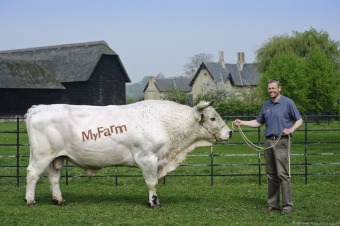 Chances are good that at some point you have dabbled with the Internet game sensation, FarmVille. I mean come on, who wouldn’t want a chance to run their own farm, upgrade and own property, even if it’s virtual. FarmVille, one of the most played Facebook games to date, has caught the attention of some, let’s call them, extremely open minded farmers. Although this experiment is daring and the success of the project could fail, it is still a very innovative approach to any task.
Chances are good that at some point you have dabbled with the Internet game sensation, FarmVille. I mean come on, who wouldn’t want a chance to run their own farm, upgrade and own property, even if it’s virtual. FarmVille, one of the most played Facebook games to date, has caught the attention of some, let’s call them, extremely open minded farmers. Although this experiment is daring and the success of the project could fail, it is still a very innovative approach to any task.
My Farm Experiment is located on the Wimpole Estate, an actual farm located in the UK. Owned by the National Trust, a British charity, they are opening the doors to somewhere around 10,000 people to help the farm manager Richard Morris run the farm. Now, this may seem better than the game FarmVille, and it very well might be, but it comes at a cost. £30, which is about $49 is all it takes to become a virtual farmer.
If you are still confused as to the nature behind this, that is because I have purposely not told you much information. Imagine yourself has a shareholder of a large corporation. Your one vote does not change how the company is run, however, if enough people vote on something, change will be made. Same concept here; once a month the honorary virtual farmers will vote on topics from what crops to grow and which livestock shall be bred, to impacts the farm will have on the environment and the wildlife surrounding it. There are a lot of issues to be dealt with, and 10,000 minds are much more powerful than one.
 To get a better idea of what kind of decisions will need to be made, here is a shrunken version of the farm map. For a bigger scale, click on the picture itself.
To get a better idea of what kind of decisions will need to be made, here is a shrunken version of the farm map. For a bigger scale, click on the picture itself.
Seeing is believing, which is why there will be webcams setup throughout the farm, allowing you virtual farmers to keep an eye on your experiment. I applaud the UK for taking on an experiment of this kind. It is using the power of social media and the games we have all indulged in and continue to love, and turning it into productive, profitable, and eco-friendly work. Here is a short video of Richard Morris outlining how the program works.
Social media gives companies, small or large, the ability to directly interact and engage their consumers. This experiment goes far beyond the concept of consumer engagement, as the audience directly impacts the success or failure of the task at hand. I am sure we are all curious as to what doors are to be opened by social media and this type of experiment. Will social media experiments like this give the consumer the power decide how companies spend their funds, create budgets, etc…? The future is unknown, but placing the decision into the hands of their consumers may be a double edged sword.





Leave a comment